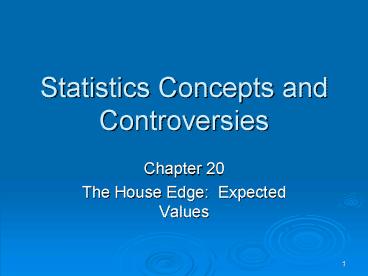Statistics Concepts and Controversies - PowerPoint PPT Presentation
1 / 16
Title:
Statistics Concepts and Controversies
Description:
Tri-State (New Hampshire, Maine, and Vermont) Lottery: ... Because each ticket costs $1, in the long run you lose 50 cents on each lottery ticket. ... – PowerPoint PPT presentation
Number of Views:131
Avg rating:3.0/5.0
Title: Statistics Concepts and Controversies
1
Statistics Concepts and Controversies
- Chapter 20
- The House Edge Expected Values
2
Expected Values
- Expected values combine outcomes with their
probabilities to give long-term or average
outcomes of a numerical random phenomenon. - An expected value is an average of the possible
outcomes that weighs each outcome by its
probability. - Outcomes that occur more often get higher
weights. - Outcomes that occur less often get lower weights.
- Expected values relate to the big picture, not
the individual outcomes. - Gambling Example A gambler cares about how much
he/she will win in the long run in addition to
his/her probability of winning.
3
Calculating Expected Values
4
Tri-State Lottery Example 1
- Tri-State (New Hampshire, Maine, and Vermont)
Lottery - Pay 1 and choose a 3 digit number (i.e., 123).
- The state chooses a 3 digit number at random and
pays you 500 if your number is chosen. - There are 1000 3 digit numbers.
- Your probability of winning is 1/1000 (0.001).
5
Expected Winnings (Long-run Average) in the
Tri-State Lottery
- The long run average winnings from a ticket are
0.50. - Because each ticket costs 1, in the long run you
lose 50 cents on each lottery ticket.
6
Rolling the Die Example
- What is the expected value for the roll of a fair
die? - What if the die has two 4s and no 1?
7
Multiple Choice Test Example
- Some tests penalize for guessing. If there are 5
choices then they will give 5 points for a right
answer, 1 point for no answer, and 0 points for a
wrong answer. - What is the expected number of points for a
guess? - What if you can eliminate one answer as wrong?
8
The Law of Large Numbers
- An expected value is an average of the possible
outcomes, which outcomes with a higher
probability count more (weighted higher). - An expected value also represents the long-run
average we will actually see if we place a bet
many times or choose many households at random. - An expected value is the long-run average.
- The Law of Large Numbers
- If a random phenomenon with numerical outcomes is
repeated many times independently, the mean of
the actually observed outcomes approaches the
expected value.
9
The Law of Large Numbers
- The law of large numbers is closely related to
the idea of probability. - In many independent repetitions, the proportion
of each possible outcome will be close to its
probability. - House advantage Casinos are guaranteed a profit
if enough bets are placed in a casino. - Insurance companies
- Insurance companies know the probabilities and
rely on the law of large numbers to predict the
average amount (expected value) they will have to
pay out. - Then the companies set premiums high enough to
guarantee a profit.
10
Thinking About Expected Values
- How large is a large number?
- Depends on the variability of the random
outcomes. - The more variable outcomes, the more trials are
needed to ensure that the mean outcome is close
to the expected value. - Is there a winning system to beat the odds?
- Does doubling your bet on the roulette wheel beat
the odds? - Such a system tries to take advantage of the fact
that you have a memory even though the roulette
wheel does not. - No. If you do not have an infinite fortune to
gamble, your average winnings (expected value)
remains the same as long as successive trials of
the game are independent (such as spins on the
roulette wheel).
11
Roulette Wheel Example
12
Roulette Example
What is your expected winnings (average winnings)
if you play roulette until you win (max 4 times
in a row)?
13
Simulating Expected Values
- You have a 30 chance of making a basket when
throwing a wadded up paper into the trash. If you
miss the first time, your second shot is made
from closer and you have a 70 chance of making
it. - If you miss again you will just drop it in from
next to the can (100). - On average, how many shots will it take?
- Recognize that this is an expected value
question. - Using the random number table
- Shot 1
- 0-2 is a basket (30 chance)
- 3-9 is a miss (70 chance)
- Shot 2
- 0-6 is a basket (70)
- 7-9 is a miss (30)
14
Simulating Expected Values
15
Another Example
- The World Health Organization has some money that
it can invest in either a new experimental
vaccine or in new water systems in developing
countries. - If the vaccine works it will save 1,000,000 lives
- If it does not work then it will not save any
lives. - The new water systems are known to work and will
save 500,000 lives. - If we estimate that the vaccine has a 40 chance
of working, what is the expected number of lives
it will save? - 1,000, 000 x 0.4 400,000
- What if it has a 70 chance of working?
- 1,000,000 x 0.7 700,000
16
Statistics Concepts and Controversies
That's All Folks
- Chapter 20
- The House Edge Expected Values































